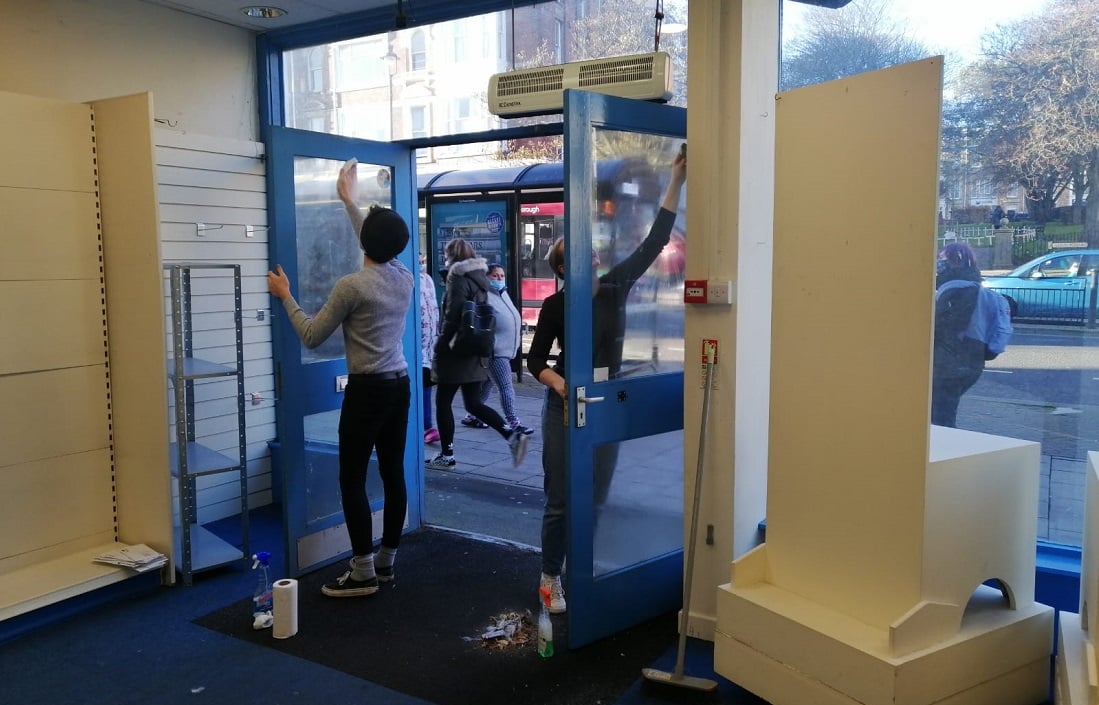
Volunteers preparing the vacant shop at 49 Westborough Street in Scarborough.
Photo: Martha Cattell
Embracing a sense of slowness
Jon Flinn shares what happens when locking down provides the opportunity to reach up and out.
Most small arts organisations live hand to mouth existences, with typically underpaid and overworked staff who, even at the best of times, are left with little space to just take a breath. For many, the emergence of Covid-19 and lockdown intensified the permanent struggle for survival – but it’s not an experience shared by everyone.
As some frantically filled in furlough forms and emergency funding applications, others were able to use lockdown as a chance to stand back, take stock of where they were heading, and make some of the strategic changes needed to get there.
Scarborough’s Crescent Arts is a case in point. Set up 40 years ago, the contemporary art organisation provided workshops, exhibitions, studio space and artist development. It had delivered some ambitious and high-profile projects in its time, including The Art Party Conference in 2013 and Helen Sear’s 2018 exhibition Prospect Refuge Hazard at Dalby Forest and Ryedale Folk Museum.
Perfect timing
However, as it entered its 41st year, long-time director Stuart Cameron announced his retirement and Crescent Arts’ trustees looked to chart a course for the next phase of the organisation’s development. Arts Council England had taken note – it warned that change was needed if Crescent Arts wanted to keep its NPO status.
Then Covid struck. An experienced interim director, Adrian Friedli, had been appointed by trustees to set ambitions for the organisation’s future and address issues of visibility and relevance raised by stakeholders. As an NPO, Crescent had no immediate lockdown money worries. Income from studio rentals and workshops had stopped, but the organisation’s running costs were low and spending on people and programmes were cut before the pandemic (Stuart had been the only paid member of staff).
Lockdown gave Crescent Arts a perfectly timed window to focus on the urgently needed strategic changes without the usual distractions and pressures that small arts organisations face.
Adrian said: “We needed to make big changes and it was an opportunity to do things that would never have been possible if the organisation had been continuing to run a full-time programme at the same time.”
Making the change
Visibility – in every sense – was one of the biggest issues facing Crescent Arts. Its home was in the former basement kitchen of a large house. It had no disability access and its labyrinthine spaces were completely unsuited to the era of social distancing. What’s more, the location meant people in the outside world had little sense of what was going on inside.
Adrian and newly recruited programme manager Martha Cattell, a Scarborough-based artist, have worked closely with trustees in the months following lockdown to address the visibility issue by broadening Crescent Arts’ outlook and connections, improving its local profile, and making its activities more apparent to people beyond Scarborough.
The work started at home. Crescent Arts’ basement is beneath a gallery operated by Scarborough Museums Trust but there was no formal working relationship between the two so, in dialogue with the Trust, a partnership agreement has been established that sets the basis for shared resources and joint projects. The agreement resulted in new initiatives like a racial justice scheme and talent development programme for local school leavers interested in art – just one of several undertakings to help connect Crescent Arts with the community around it.
Crucially, the agreement gave the organisation a temporary new home next door in the Woodend Creative Centre and, with it, a chance to literally and metaphorically emerge from the confines of its basement into a ground floor space complete with its own accessible exhibition area.
Growth spurt
Lockdown has extended Crescent Arts’ reach in other ways. The team has revived a dormant relationship with nearby Dalby Forest, giving the organisation a presence beyond Scarborough. There have been discussions about artist residencies and an opportunity to deliver on some of the environmental commitments in the Crescent Arts’ new mission statement.
It now also has a temporary high street presence following conversations with Leeds-based East Street Arts to take over a vacant shop in central Scarborough. Thanks to Martha’s local connections, it is also in talks to work with other community groups, including the town’s South Cliff Gardens and library service, and there’s interest from Dalby Forest to find new partners to take forward an ambitious proposal originally submitted to Festival 2022.
Martha says: “There’s a lot pressure in the arts to constantly have an output but this has given us a pause and a really valuable chance to inhabit a ‘sense of slowness’. Lockdown has given us time to work out who we are, who else is working in the area, and how we can best connect with the communities around us.”
Silver linings
The Crescent Arts team don’t yet know if they’ll be returning to the old basement kitchens but the changes they’ve made in other areas since lockdown have not gone unnoticed. The Arts Council is encouraged by the new community focus and people in and around the town have acknowledged the new, more visible and dynamic organisation too. People believe in the change that is happening here.
The transformation over the last few months has prompted Adrian to suggest that lockdown has been “the making of Crescent Arts”. His view may not reflect the Covid-19 experience of many in the sector right now but it’s a reminder of how, with the right timing, even the darkest clouds can bring a silver lining for a few, lucky organisations.
Jon Flinn is a culture communications specialist and communications director at DHA Communications.
![]() www.dhacommunications.co.uk
www.dhacommunications.co.uk
![]() @CrescentArts | @DHAComms
@CrescentArts | @DHAComms
Join the Discussion
You must be logged in to post a comment.